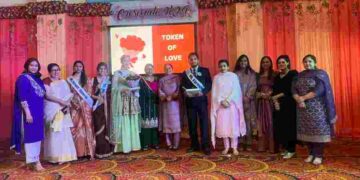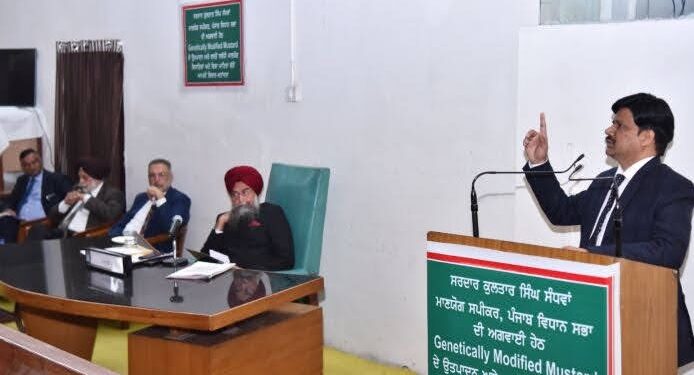Purpose of the discussion is to strengthen democracy and sensitize the legislators about the issues of public importance – Sandhwan
“Serious discussion is necessary in advance to avoid loopholes in the law”
Agriculture experts, Scientists and farmer’s leaders presented their views on the GM mustard
Chandigarh, January 16:
During the discussion brain storm on the GM mustard in the Punjab Vidhan Sabha, Vidhan Sabha speaker S. Kultar Singh Sandhawan said that the purpose of this discussion is to strengthen democracy at the grassroots level and sensitize legislators about issues of public importance.
S. Sandhwan said that before a law is made on any subject, there is a need for a thorough debate on it at every level so that there should be no flaw in it. He said that Punjab is an agriculture-based state, due to this there should be a serious debate on the GM (Genetically Modified) mustard. S. Sandhwan said that agriculture is a state subject and it should be left for the discretion of the states. If the central government forcefully implement it, it would inevitably be an attack on federalism system.
During the discussion on G. M. mustard, scholars gave their opinions on many aspects like its yield, quality, environment, impact on health etc. and two types of ideas emerged in support and resistance to it. The discussion was started by Kapil Bhai Shah, an agriculturist expert from Baroda, followed by a professor from Punjab Agriculture University, Ludhiana. Dr. Jagdeep Singh Sandhu, former pathologist from P.A. U. Ludhiana Dr. Satwinder Kaur, Dr. OP Chaudhary, Dr. Pratap Kumar, Head of Biotechnology department G.N.D.U., Vice Chancellor of Punjab Agricultural University Dr. Satvir Singh Gosal, VC of Guru Angad Dev Veterinary and Animal Sciences University, Ludhiana. Dr. Inderjit Sigh, eminent agriculture expert Dr. Devinder Sharma, Executive Director of Agricultural Heritage Mission Mr. Ominder Dutt, agricultural expert Kavita, eminent farmer’s leaders Mr. Balbir Singh Rajewal, Mr. Jagjit Singh Dallewal, Mr. Jagmohan Singh and Rajinder Singh Deep Singh Wala presented their views.
Agricultural experts were of the opinion that Genetically Modified (GM) mustard has been created by tampering with the Indian mustard gene and will not be affected by any pesticides. When the mustard crop is ready, its oil will be extracted but its seed cannot be sown again. So every year its seeds have to be bought by the farmers from the company. With the arrival of this crop, farmers will become dependent on companies.
While many experts were of the opinion that the area under mustard cultivation has decreased due to low production of seeds, some said that this has happened due to non-availability of proper price of mustard crop and lack of guarantee of purchase. They also said that we already have five varieties of mustard seeds with higher yields and higher oil content than what is being claimed for breeding with GM mustard seeds. In resistance to GM mustard, experts have expressed concern that this mustard will have a negative effect on health and will not be good for health. Honey bees and pollinating insects are also thought to be most harmed by GM mustard. Many said that allowing G.M. mustard seeds is part of the Indian government’s policy to push farmers out of agriculture and hand over food to corporate houses. It was also said that the patent of the seed technology was held by multinational corporations. Opponents of GM mustard believe that the Indian government wants to establish a monopoly of multinational companies by eliminating the traditional and indigenous seeds of crops, vegetables, pulses and oilseeds, thereby making farmers their patrons.
Meanwhile, Punjab Health Minister Dr. Balbir Singh said that bookish knowledge as well as practical knowledge should be kept in mind while implementing such crops. In this regard, there we should not depended on only scientists, but the opinion of the farmers involved in this process should be taken into consideration. During this discussion, Agriculture Minister Mr. Kuldeep Singh Dhaliwal, about two dozen MLAs, agricultural experts, farmer’s leaders and officers of various departments were also present.








